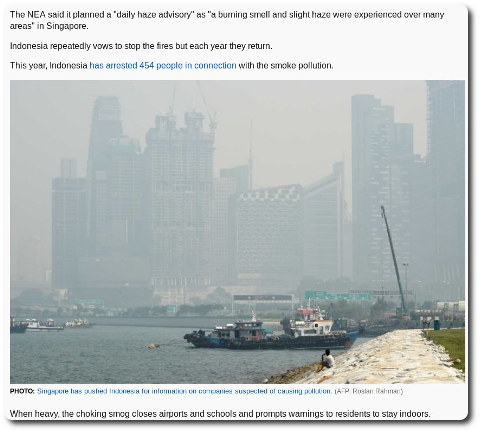Bad policies and inability to learn lessons from the failed experiment in the US

Hazy forecast for an increasingly greedy Asian industry (photograph/source: "Smoke from Indonesian fires hits 'unhealthy' levels in Singapore as authorities push to hunt offenders")
Summary: Patent maximalism and patent hoards which include software patents cause a climate of fear and confrontation, not innovation or collective prosperity
THE ONLY region other than the US where software patents exist is east Asia, although there too there are limitations (there are no software patents in India, Europe and arguably not in Australia either, definitely not in New Zealand and South Africa).
Looking at
a new article by the Intepat Team from India, they mostly explore how to get patents in other countries, notably Europe and the US. They're trying to make money by doing in other countries what they cannot do in India because activists (not just Indians) guard against corporate lobbyists and patent lawyers. In Singapore, by contrast, software patents exist (there is also a large Indian population there) and MIP
has this new article regarding Singapore, titled "Inventors, investors and software patents" (as if these three things are connected, as per the myth).
"InnovFest unBound," MIP said, "showcased Asia's most innovative media and healthcare technologies. Presentations from fintech companies, multi-national media and software companies and global product giants emphasised the need to protect the IP underpinning new technologies and new products."
That's nonsense. It's basically software patents lobbying in thin disguise. Consider
Creative of Singapore becoming a de facto patent troll because it can no longer sell actual products (or can
hardly sell anything before patents expire). It's truly embarrassing not just for Creative but also for Singapore; the company reaffirms its new status as "patent troll" in Texas with yet another lawsuit, this time targeting the British (soon Japanese) ARM and the Singaporean regime's mouthpiece (notorious media company)
wrote:
Creative Technology yesterday said its wholly owned subsidiary ZiiLabs Inc has filed a patent infringement lawsuit in the United States against tech firm ARM.
ZiiLabs owns over 80 US patents in the graphics, processor and 3D spaces.
Four of these patents were asserted in the lawsuit, in which ZiiLabs is claiming damages for patent infringement, and an injunction against ARM.
The lawsuit was filed on Sept 2 in the Eastern District of Texas.
Creative was a decent company in the 1990s (I used their hardware and their software). They ran out of business plans, they might soon go out of business, and thus they are becoming patent parasites. Is this the kind of 'entrepreneurship' Singapore wants to be known for? Patent trolling? And with software patents, too?
Elsewhere in the patent microcosm, IAM has a
series of new articles about patents in Asia and Jack admits that "patent filings and patent ownership alone cannot give anything like a full account of an organisation’s innovative capacity."
So why are they so often peddling this myth at IAM? Here is
another new IAM article, implicitly or tacitly acknowledging that South Korea has a patent bubble which is already imploding. Similar things
seem to be happening in Japan and China is sweeping up the dust. To quote IAM: "In the wake of Foxconn’s historic $3.5 billion purchase of a majority stake in Sharp, streamlining and rationalisation of the Japanese company’s extensive IP portfolio are high on the agenda for its new Taiwanese owners."
Despite having a pile of patents, Sharp is worth only about a tenth of ARM (which is British, at least until the acquisition is complete). In China,
says MIP, "Computer software accounts for about 40% of cases in the Shanghai court" (so they're becoming more like the
USPTO with low quality control and software patents). An
article about China from IAM says "Zhigu and Ruichuan are now controlled by a single operating company [and it] would seem to cement the idea that they're in a separate category from IP Bridge and Intellectual Discovery. In the absence of some kind of public deal that shows the fund licensing patents or intervening in litigation on behalf of a Chinese company that isn’t Xiaomi, it may be time to stop characterising it as a sovereign fund."
This again emulates the kind of trolls-infested patent landscape we see in the United States. Why would Asian nations wish to shoot themselves in the foot like this? Regarding China, IAM has
another article about patents as instruments of tax evasion, using the kind of loopholes we already see in Europe (e.g. patent boxes, which are tax evasion scams). IAM should know this in light of its coverage about Apple in Europe (see
"Europe’s multi-billion dollar tax ruling against Apple throws treatment of IP assets into spotlight").
The bottom line is, the way things are going in Asia are not encouraging. They fail to heed the warning of US patent chaos and troll infestation. Asia is, in a sense, becoming a powerhouse for potential patent trolls (we recently covered notable new examples of Chinese companies going to the US to sue US companies using patents, typically in plaintiff-friendly courts like those down in Texas).
⬆

